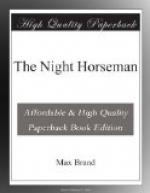He swung the head of his horse to one side, drove deep the spurs, and leaning his head to the volleying of the rain he raced in a direction opposite to that in which Haw-Haw Langley had disappeared, in a direction that led as straight as the line of a flying bird towards that cabin in the mountains.
Now and then the forefeet of his great horse smashed into a pool and sent a muddy shower of rain flying up. It crackled against his slicker; it beat like hands against his face. Everything was striving—all the elements of wind and rain—to hold him back.
Yet flight brought a blessed sense of relief and of safety. He eased the pace of his horse to a moderate gallop, and no longer driving blindly through the hills, he made out, by peering into the blast of rain, some of the pools which lay in his path, and swung aside to avoid them.
The rain lightened again about him; he caught a view of the kindly, sheltering hills on all sides; but as he urged his horse on towards them a shrill flight of whistling fell upon his ears from behind. He drew his horse at once to a halt and listened with his heart knocking at his teeth.
It was impossible, manifestly, that the fellow could have followed his track through the rain. For that matter, if the wolf-fiend could follow traces over a plain awash with water, why might they not as well follow the tracks of Haw-Haw Langley? There was no good reason.
The whistling? Well, the whistler was far away in the heart of the storm, and the sound was merely blown against the wind by a chance echo. Yet he remained holding his rein taut, and listening with all his might.
It came again, suddenly as before, sharp, and keen as a shaft of light in the blackest heart of night, and Mac Strann leaned over the pommel of his saddle with a groan, and drove the spurs home. At the same instant the rain shut in over the hills again; a fresher wind sprang up and drove the downpour into his face. Also its roar shut out the possibility of any sound reaching him from behind.
He was the worse for that. As long as the whistling might reach him he could tell how near the pursuer rode; but in this common roar of the rain the man might be at any distance behind him—on his very heels, indeed. Ay, Dan Barry might rush upon him from behind. He had seen that black stallion and he would never forget—those graceful, agile lines, that generous breast, wide for infinite wind and the great heart. If the stallion were exerted, it could overtake his own mount as if he were standing still. Not on good footing, perhaps, but in this mucky ground the weight of his horse was terribly against him. He drove the spurs home again; he looked back again and again, piercing the driving mist of rain with starting eyes. He was safe still; the destroyer was not in sight; yet he might be riding close behind that wall of rain.




